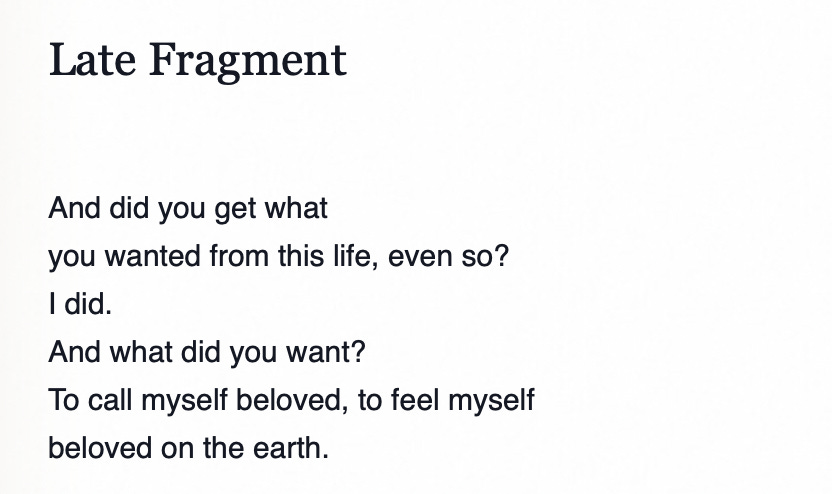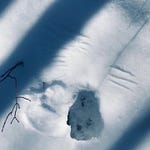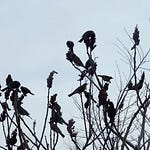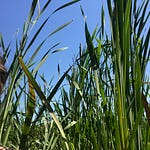The other morning, I was squirming for no reason I could point to, just a restlessness that wouldn’t be reasoned with. You know, that unease that seems to come some days from just living. Pretty well-entrenched and well on my way to panic, I was about to settle into that new, familiar rut when I heard a gobble. My head turned, my ears locked in - two hundred yards to the north and he wanted to talk. I got up from my list of troubles in a trance and walked outside. Sitting under an oak in a ghillie suit, trying to look like leaf litter while giving him my best “girl next door” with soft hen yelps, light scratching, and a purr, I forgot myself, only for an hour, but I was gone, and that’s exactly what I needed.
Sometimes, if I’m stuck inside myself, and things are feeling pressurized, a caw from a raven or a whistle from a chickadee can queue me to caw back - and just the opening of my mouth relieves some pressure. I have heard from well-traveled psychedelic explorers that if you’re having a bad trip, it can be helpful to sing or make any noise that you’re able. I think there is really something to this. Opening the mouth can feel like flinging open a window to some barred and shuttered room where I’ve been holding myself hostage, and the voice can be my ride out of the swirling, sucking, interior that seems so commonly troubling in the modern human experience.
This time of year can be kind of racy. Not in the sexy way - panting and sweating, yes, but only from chasing my tail, or attempting to climb hills I maybe have no business climbing. This can inflame all kinds of feelings and old habits that are not helpful. I’ve become curious about seasonality regarding emotions. Seasonal affective disorder is now commonly acknowledged and people seem to resonate with and accept that the lack of light in winter can really affect our mental well-being, but what about this bright, shiny, spring sadness? There’s no darkness to blame, now, it’s light till almost 9 pm, but in place of the heavy, dull, blanket of winter blues, there can come something more acute, but harder to name.
I looked back to the spring of previous years in my journals and photos and found pages of green in April, then, in May, self-portraits taken with flowers, just like the one I took three days ago with a daffodil. Selfies with flowers are not notable, but what is, is that I remember on each of these days I’d been crying, again, for no reason I could name. On paper, everything was perfect, which only pours shame on the wound really, but the finding of the flowers, the picking of the flowers, the identifying with the flowers, on each occasion, all brought relief. Then came the meals. I ate and I ate. The spring turkey and trout and absolute mountains of vibrant greens - the foods of spring come alive again and share their life with me. From there, a rising, a riding the wave of summer, but only after coming up gasping from this sort of riptide of May.
Calling it a riptide just brought back a memory I haven’t thought about in a long time that is actually really fitting, here. I was young, early grade school, and I was at the beach with my best friend, Jason, and our moms. Jason and I went swimming while our mothers watched from the sand. We got sucked into a riptide, pulled in and tumbled around and around pretty good and Jason clawed into the sand with one hand and hauled me out with the other. We ran back to our mothers, who were clapping, thinking they had just watched an elaborate, synchronized swimming routine, and had no idea what had happened until we told them. This is a hilarious memory, but isn’t it a kind of perfect show of how great the divide can be between the experience of one’s life and the appearance of it?
A local young man, a fellow forager, died a few days ago. He walked into the woods and never came out. The cause of death was not disclosed but he was reported to have been in emotional distress before he went missing. Today marks ten years since a friend from my hometown, friend of my whole hometown, waded into the ocean and never came out. Neither confirmed as suicide, both suspected. We can’t know. There’s lots we can’t know from here on the sand.

I’m feeling pretty good these days, but I still feel keenly the times when I haven’t. Lately, I’ve been tousling more with these new sucker-punch style panic attacks than with the trusty ol’ depression, which, curiously, has moved depression completely onto the back burner and turned off the heat. Whiffs of that murky, May melancholy have been wafting in, but thankfully it piques my interest, now, more than it overwhelms me. Curiosity, I’ve found, can be a powerful antidote to fear. From within this curious state, I’ve noticed some things that have proven helpful to me even on my best days when I didn’t think I needed help, pretty reliably on my worst when I needed all the help, and most notably, on all the in-between days that would otherwise be lost to the cruel illusion of mediocrity - the thing I think most people need help from, regardless of their mental health.
Rather than a shiny, organized toolbox, I share with you, more of a junk drawer of well-worn, trusty trinkets. Take from it what you will.
Hunting Mind
If I’m feeling anxious or depressed, nothing lifts me out of it like hunting. There is absolutely no room for anything in your mind or body except being a predator and outwitting an animal that has no room for anything in its mind except surviving. I’m not alone or unique in this observation, I’m sure it’s as old as hunting is, which means it’s as old as we are, but since I did not grow up hunting, this has been revelatory for me to learn as a worry-wracked adult. I’ve found that even if I’m not actually hunting, but I want to step into the mindset, I can (almost) replicate it by even stalking insects or birds in the yard with my camera. This poem I wrote, which you can hear me read aloud by pressing play at the top of the page, speaks to some of the ways that hunting has been important to my mental health. I think the key element here is “we’ll think about things other than ourselves.”.
To a Troubled Friend.
Will you come hunting with me?
Don't even bring a gun,
most times you won't need it.
I know you don’t want to face death,
just take a walk with me at dusk in late November
and we'll think about things other than ourselves.
That's all we're doing out here.
You'll get to question things that you can never know
but will never stop asking
How can it be
that a leaf falling is as loud as a squirrel running is as loud as a deer walking up from behind,
and how can a bear make no sound at all?
You'll see that you drag your scent behind you like a rope,
but so does everyone else.
You'll linger over every low spot in a rock wall.
The logging cut that slopes down to the marsh will make your mind run wild.
You'll fawn over every inch of that white oak like the first time she showed you bare skin,
and worship the mud of the cattail swamp for revealing
you're never alone.
You'll know the names of the lives that were lost
and you'll think about them
like you think about a friend who's passed.
What could I have done?
What can I do better now?Dog Mind
As sappy as it sounds, Sal is my most consistent and effective tool for wellbeing. Whether I need her as a companion or especially as an example, she excels with her dogness which is usually the perfect antidote to my humanness. I could list all the ways but I just did that in my head and it sounds like a bad motivational poster, so here’s this poem instead.
Dog Mind
The person mind, tied to the person body
gallops
like a wrangled wild horse
tethered crudely in a bare dirt ring
knowing it’s life had no horizon
out on the plains
unbridled.
I’m not quite ready to be untied
so I pet the pony,
palm up some grain
and try to get into dog mind.
A friend told me he does this when his person mind is running hot
and he’s only ever barely made it
but the do is in the try.
I sit with Sal on haunches
wet nose up, wide open
She has never caught a chipmunk
but it doesn’t seem she knows it
And then I cock my head, remembering
our other life
spent by the stove -
legs kicking
eyes closed.
Eat Vividly.
This, I’ve adopted from the notoriously vivid Jim Harrison - a boisterous proponent of using food and wine as tools to bolster the spirit, and though he may have drunk more than his body appreciated, I could not agree with him more. I swear that he wrote somewhere “I eat well to avoid suicide.” but I can’t find evidence of this quote, though I did find “Sometimes the only answer to death is lunch.”, so maybe I just paraphrased. Some days I find it helpful to eat for my physical health, like, if I’m feeling anxious and brittle I’ll lean into little fatty fish to keep the brain pliant, or a bowl of acorn grits with bear fat for gentle, steady fuel, while some days, especially if I’m feeling down, I eat purely for pleasure, and the enjoyment I get from that has contributed as much to my health than any other thing, I am sure of it. Vivid, to me, means at the very least, it was once alive, and at its best, it makes you feel so.
“Tend to the Part of the Garden You Can Touch”
This has been an invaluable concept for me. I first learned it from a meditation teacher as a strategy for reigning the mind in, and it turns out, I can apply it to almost every scenario I can think of. The garden can be my actual garden, but it’s also my mind, body, home, family, community, and so on. For me, it’s come to mean, taking care of the thing nearest to me, whatever is within reach, and not worrying about the next thing until I finish, like making the bed, cutting my nails, tending the actual garden and while I’m tending the actual garden, focusing on one task until it’s finished, making tea, texting friends and family, sweeping the floor, meeting a writing deadline, paying a bill, making dinner, and so on. When I feel myself spinning out, I say this to myself, and I’ll choose the thing nearest to me that needs tending, whether physically near, or the nearest task on the calendar, and give it my full attention. Repeat.
It’s funny to see the synchronicities that show up when I do this, like, when we first bought this land, and part of “tending the part of the garden I could touch” then was learning the plants on the land, and I found, in spring, the place is carpeted with dwarf ginseng, one of this region’s only native adaptogens. It’s become one of the plants that I reach for most in stressful times. Here’s a little vignette I wrote about our relationship.
This week. I was feeling stressed, I was planting peppers in the garden, finding it hard to work around this “weedy” plant Sonchus oleraceus. In an attempt to turn my resistance to curiosity, I looked up potential uses for the plant, and wouldn’t you know it, the predominant medicinal use is for depression.
Similarly, when I decided what I wanted to write about this week, I immediately started seeing other people talking about it, like when you get a new car and you all of a sudden, start noticing it everywhere.
Thanks, Linda Black Elk
Thanks, Jay Zimmerman
Thanks, Maria Popova
Thanks, OnBeing Podcast
And a special thanks to the friend who sent me this text precisely when I was getting cold feet about writing any of this.
Sometimes, it almost seems like we’re all in this together, huh?
























Share this post